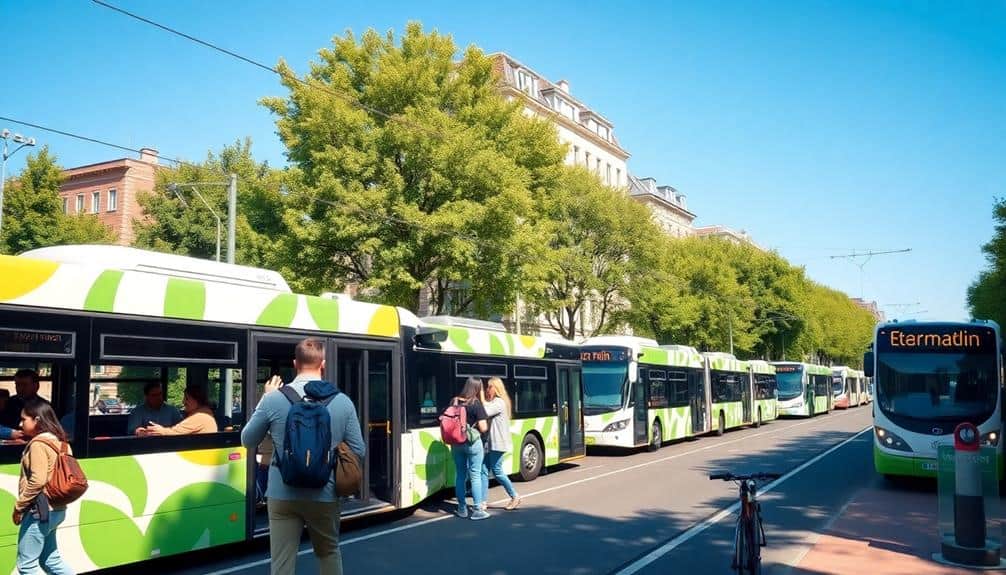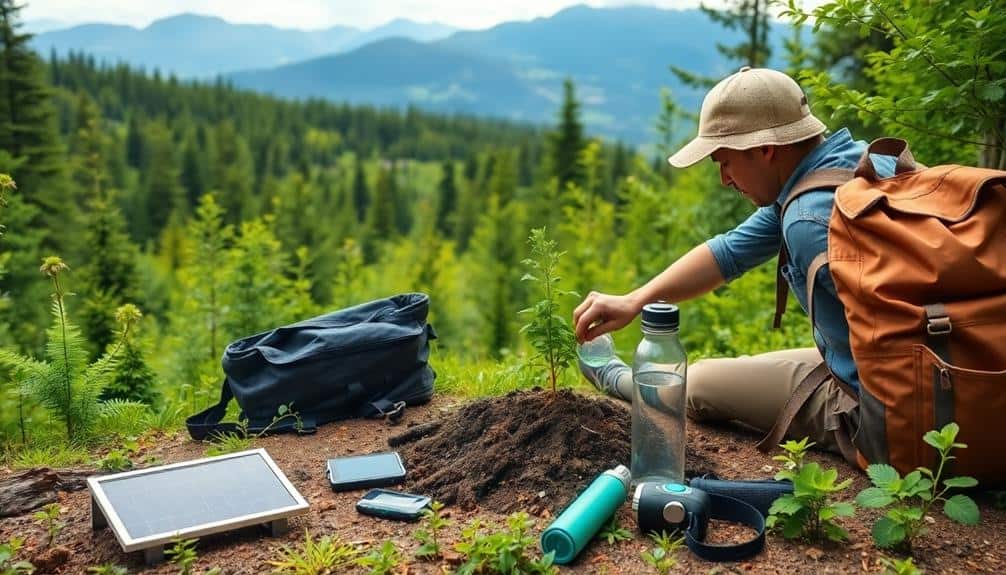
7 Green Globetrotting Tips for Sustainable Explorers
To become a sustainable explorer, prioritize eco-friendly accommodations with green certifications, pack light using versatile and quick-drying clothing, and opt for public transportation to reduce emissions. Support local communities by choosing locally-owned businesses and participating in cultural initiatives. Minimize single-use plastic by carrying reusable items like water bottles and cutlery. Respect wildlife and nature by maintaining safe distances and following designated trails. Finally, consider offsetting your carbon footprint through reputable providers to mitigate your travel's environmental impact. These practices not only reduce your ecological footprint but also enhance your travel experience, allowing you to engage more authentically with your destinations. Adopting these habits will open up a world of responsible exploration.
In a Nutshell
- Choose eco-friendly accommodations with green certifications to support sustainable practices.
- Pack light and sustainably, using recycled materials and versatile clothing.
- Utilize public transportation to reduce carbon emissions and experience local culture.
- Support local communities by choosing locally-owned businesses and participating in community-based tourism.
- Minimize single-use plastic by bringing reusable items like water bottles and cutlery.
Choose Eco-Friendly Accommodations

Eco-warriors, your choice of accommodation can make a significant impact on your travel footprint. Opt for hotels, resorts, or lodges that have obtained green certifications, such as LEED, EarthCheck, or Green Globe. These establishments typically implement energy-efficient practices, water conservation measures, and waste reduction programs. Look for properties that use renewable energy sources, like solar panels or wind turbines, and those that employ local staff and source ingredients locally for their restaurants. When packing for your eco-friendly stay, consider bringing reusable utensils and a water bottle with built-in filtration to minimize plastic waste during your travels.
Consider eco-lodges or agritourism accommodations, which often have a minimal environmental impact and support local communities. Many of these properties offer unique experiences, such as guided nature walks or farm-to-table dining. When booking, inquire about specific sustainability initiatives, including towel and linen reuse programs, recycling facilities, and the use of biodegradable toiletries. By choosing eco-friendly accommodations, you'll reduce your carbon footprint while supporting businesses that prioritize environmental stewardship.
Pack Light and Sustainably

How you pack can greatly impact your travel sustainability. Opt for a lightweight, durable suitcase or backpack made from recycled materials to reduce your carbon footprint. Choose versatile, wrinkle-resistant clothing that can be mixed and matched, allowing you to pack fewer items. Invest in high-quality, quick-drying fabrics that require less frequent washing and air-dry quickly.
Utilize packing cubes to maximize space and organization, enabling you to fit more into a smaller bag. These handy organizers come in various sizes and materials, with options like mesh panels for easy content visibility and compression features to save even more space. Replace single-use toiletries with reusable containers filled with eco-friendly products. Pack a reusable water bottle, shopping bag, and utensil set to minimize plastic waste during your travels. Consider bringing a portable solar charger for your electronics, reducing reliance on local power grids. By carefully selecting multi-functional items and prioritizing sustainability, you'll lighten your load and minimize your environmental impact while exploring the world.
Use Public Transportation

Why settle for gas-guzzling rental cars when you can immerse yourself in local culture and reduce your carbon footprint by using public transportation? Buses, trains, and subways offer an efficient, cost-effective way to explore your destination while minimizing environmental impact. Research local transit options before your trip, and consider purchasing multi-day passes for unlimited access. Many cities now offer user-friendly apps that provide real-time schedules and route planning. When choosing your mode of transportation, consider packing light with a versatile travel backpack to make traversing public transit systems easier.
Using public transportation can:
- Reduce your travel-related carbon emissions by up to 45%
- Save you money on expensive car rentals and parking fees
- Provide authentic experiences interacting with locals
- Allow you to avoid traffic congestion and route planning stress
To maximize efficiency, familiarize yourself with the transit system's layout and peak hours. Pack light, wear comfortable shoes, and always keep a transit map handy. By embracing public transportation, you'll contribute to sustainable tourism while gaining a deeper understanding of your destination.
Support Local Communities

A traveler's impact extends far beyond their carbon footprint. Supporting local communities is a vital aspect of sustainable tourism, benefiting both the destination and its inhabitants. When exploring new places, opt for locally-owned accommodations, restaurants, and tour operators. These businesses often provide authentic experiences while safeguarding your money directly benefits the community. Purchase souvenirs and handicrafts from local artisans, supporting traditional craftsmanship and cultural preservation. Engage in community-based tourism initiatives, which often include homestays, cultural workshops, or guided tours led by residents. Participate in volunteer programs or donate to local charities, but research thoroughly to confirm your efforts are genuinely helpful. Learn about and respect local customs, dress codes, and etiquette to minimize cultural friction. By making conscious choices, you'll contribute to the economic well-being of your destination while fostering cross-cultural understanding and preserving unique traditions.
Minimize Single-Use Plastic

Single-use plastics frequently plague the travel industry, but you can easily reduce your environmental impact by adopting a few simple habits. Start by investing in a reusable water bottle, preferably one made of stainless steel or glass, to avoid purchasing disposable plastic bottles. Pack a set of travel cutlery, including a fork, spoon, and chopsticks, to eliminate the need for single-use plastic utensils. When shopping, bring a foldable tote bag to decline plastic shopping bags.
To further minimize your plastic consumption while traveling, consider these actions:
- Use solid shampoo and soap bars instead of liquid products in plastic bottles
- Carry a reusable straw made of metal or bamboo
- Opt for package-free snacks or bring your own in reusable containers
- Choose accommodations that prioritize eco-friendly practices and minimize plastic use
Respect Wildlife and Nature

While reducing plastic waste is important, responsible travelers must also consider their impact on local ecosystems and wildlife. When exploring natural areas, stick to designated trails and viewing platforms to minimize habitat disruption. Maintain a safe distance from animals, using binoculars or telephoto lenses for observation instead of approaching them directly. Never feed wildlife, as this can alter their natural behaviors and create dangerous dependencies. Be mindful of your noise levels, especially in sensitive habitats or during breeding seasons. Choose eco-friendly tour operators who prioritize conservation and follow ethical wildlife viewing practices. When snorkeling or diving, avoid touching coral reefs or disturbing marine life. Always pack out what you bring in, leaving no trace of your visit. By respecting nature's boundaries and following local guidelines, you'll contribute to the preservation of fragile ecosystems for future generations to enjoy.
Offset Your Carbon Footprint

Travelers' carbon footprints can be substantial, especially when flying long distances. To mitigate your impact, consider carbon offsetting programs offered by airlines or independent organizations. These initiatives invest in projects that reduce greenhouse gas emissions, such as reforestation or renewable energy development. Research reputable offset providers to guarantee your contribution makes a meaningful difference.
When choosing carbon offset options, consider the following factors:
- Additionality: Confirm the project wouldn't have happened without offset funding
- Permanence: Select projects with long-lasting impact
- Verification: Look for third-party verification of emission reductions
- Co-benefits: Prioritize projects that offer additional social or environmental benefits
Calculate your trip's emissions using online tools, then purchase offsets accordingly. While not a perfect solution, carbon offsetting is a step towards more sustainable travel. Combine this approach with other eco-friendly practices to minimize your overall environmental impact.
Frequently Asked Questions
How Can I Find Eco-Friendly Tour Operators for My Destination?
Want to find eco-friendly tour operators for your destination? Start by researching online, using keywords like "sustainable," "responsible," or "eco-friendly" alongside your destination. Check for certifications such as Green Globe or Rainforest Alliance. Consult travel forums and review sites for firsthand experiences. Contact local tourism boards, as they often maintain lists of certified operators. Don't forget to examine the operator's website for detailed information on their sustainability practices, including waste management, energy conservation, and community engagement.
What Are Some Sustainable Alternatives to Traditional Souvenirs?
When seeking sustainable alternatives to traditional souvenirs, consider locally-made, eco-friendly options that support the community you've visited. You'll find unique items such as handcrafted jewelry, textiles, or artwork made from recycled materials. Opt for edible souvenirs like locally-produced honey, spices, or tea, which reduce waste and provide a taste of your travels. Digital souvenirs, including high-quality photographs or virtual experiences, offer lasting memories without physical impact. Additionally, consider donating to local conservation efforts as a meaningful alternative to tangible keepsakes.
How Do I Handle Language Barriers When Trying to Be Environmentally Conscious?
Did you know that 40% of global travelers feel anxious about language barriers? To handle these challenges while being environmentally conscious, you'll want to leverage technology wisely. Download offline translation apps to avoid data usage, and invest in a high-quality phrasebook made from recycled materials. Learn key eco-friendly terms in the local language, such as "no plastic bag, please" or "do you have a recycling bin?" These efforts will help you communicate your environmental values effectively while minimizing your digital footprint.
Are There Apps to Help Track My Carbon Footprint While Traveling?
Yes, there are several apps designed to help you track your carbon footprint while traveling. You'll find options like Capture, which automatically calculates your emissions based on your location and mode of transport. Another popular choice is Giki Zero, offering personalized suggestions to reduce your impact. For a more thorough approach, try Earth Hero, which provides detailed insights into your travel-related emissions and offers actionable tips for sustainable tourism. These apps can help you make informed decisions about your environmental impact during your journeys.
What's the Best Way to Dispose of Waste in Countries With Limited Recycling?
Like a seasoned explorer traversing uncharted territory, you'll need to adapt your waste disposal habits in countries with limited recycling. First, minimize your waste by avoiding single-use items and packaging. When disposing, separate recyclables, even if local facilities are scarce. Compost organic matter when possible. For non-recyclable waste, use designated bins or inquire about proper disposal methods at your accommodation. Consider carrying a reusable bottle and refilling it with treated water to reduce plastic waste. Always follow local guidelines and respect the environment.
